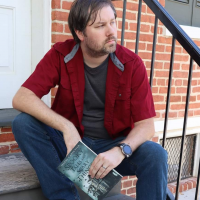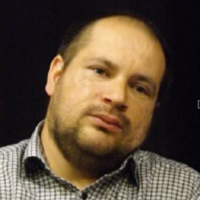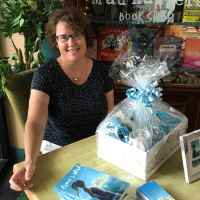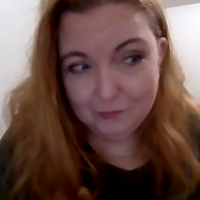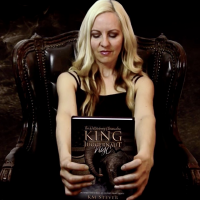1. Do something every day. Even if it's one thing...and even if it's small.
2. It's a marathon, not a sprint.
3. Small gains, pay off in the long run.
4. Be efficient with social media. Organize and use a service. It takes time to set it up but once it's set up, you'll only have to monitor and update. Use a schedule and stick to it.
5. Be strategic and relevant in your marketing.
1. You can always learn something.
2. Never stop. Even if the situation seems to call for stopping. Breaks are ok though.
3. Get out and see the world. Sometimes watching human interaction or the day to day hustle of life can inspire conversation, situation, or settings!
4. Write for you first, write for "them" second. Put what you want to put on paper first, and revise for others to enjoy!
5: Don't write for page count or word count. Write to tell the story, whether that takes 20,000 words, or 140,000. Tell the story.
1. Always judge a book by its cover. You wouldn't get into a taxi with battered body work to go to a dentist with bad teeth, would you?
2. Aim for the heart, the head, and then the wallet. In that order. A weak book, badly designed won't sell at the cheapest price. But a book that promises to move and engage someone can command a good price.
3. Make sure your designs can be read quickly - you only have seconds to draw a reader in.
4. Don't try to be too "unique." If no one is doing something, a "super idea" you have had, there might be a good reason for it.
5. Say as much as you can in the fewest words. Cut out all the stuffing. Remember, give your reader the prime cuts, because you want them to come back for more. If you fill their plate with fat and gristle they will tire of chewing.
1. Keep everything - every scribbled note, sticky note, scrawl on backs of envelopes
2. Embrace mistakes because a mistake in one book could be the genius for the next
3. Network with other writers and share wider skills, such as publishing, design, etc.
4. Use music and art to engage your emotions with your writing
5. Remember that critique and opinion are not the same thing. Ask for the former, hear the latter
1. Write everyday, even a poem if you have nothing to write about.
2. Meditate more.
3. Stay away from Tv and music in the process.
4. Connect with fellow writers.
5. Do not despise readers opinions, and talk about your writing.
Try to stick to a routine.
Read with a writer's eye.
Keep a notebook handy.
People watch.
Trust the process.
Tips and hacks for writing faster or more productively
1- discover your writing time sweet spot, 15 to 30 minute writing sprints with a 5 to 10 minute break allows for greater production
2- research, how much is necessary? Knowing your subject is important but we can get lost in the research. Start writing your story and keep track of things you need to research.
3- character analysis prep, I fill out the basics before I start, description and some important details but the rest I learn as I write the first draft.
4- I'm not a plotter but I do plan, I love sticky notes. I use different colors for characters, setting and plot points. I can add or delete them, move them around or even change them.
5- Before you stop writing each day, write a question to help you get started on the next day.
Have fun and always ask yourself "what if." Happy writing.
1) Generously sprinkle your story with passion, knowledge, and detail. Write it as though no one has read the topic before.
2) If you've not laid your soul naked on the page, keep editing.
3) Write what you know fearlessly and what you don't know with curiosity and a yearning to know more.
4) Never cut corners when it comes to hiring a professional, book editor.
5) If you're writing about a particular topic that has protocol, slang, or certain procedures, ask if you can shadow a pro to learn more. If you're not true to the reader's profession (law enforcement, for example) they'll recognize the errors and, as a reader, never be back.
.
1. Write while the thoughts and words are coming.
2. Tell people about your book.
3. Send your manuscript to as many publishers as possible.
4. Keep reading while you're writing. Read all kinds of things, not just your genre!
5. Work on your social media profile the whole time.
Let go of self-defeating language.
1. It's not "writer's block." It's the restorative pause, the time needed to refill the creative well, the release from arbitrary production "shoulds," the sensory replenisher. Trust the process.
2. It's not "rejection." It's the blessing of having avoided placing your work with the wrong entity.
3. You're not an "aspiring" writer. If you write, you're a writer. Period. Own it! (People who run every day but never race are still called runners.)
4. You don't have to have a "current project." You can just write. Anything. Trust the process.
5. There's nothing magic about 1,000 words a day or any other arbitrary number. Two perfect sentences can be a whole day's work (and worth every minute!) while 2,000 words can be boring shredder fodder. Just write. Trust the process.
(Did I mention, trust the process?)
1. Write clean.
2. Follow the rules...grammar, syntax, tense, inflection, diction.
3. Break the rules or tropes customary and commonplace to your specific genre.
4. Find the balance between writing/marketing and your personal life.
5. Never follow any authors' tips on writing unless you've read their work and it doesn't make your eyebrow quirk.
1. Don't try so hard. You have no rules! Have fun! You will want the memory of that journey later on!
2. Fall in love with & have a relationship with your characters. You get to make them exactly how you imagine them!
3. There is a beauty is making a book from just your imagination. Remember you are a creator!
4. Have a purpose, not just goals. Can your book be both entertaining AND impactful?
5. Designate time every day to it. Today could be 5 minutes, tomorrow may be 5 hours.
Don't worry about good English, spelling and etc. in the middle of writing. Get the story down, then make it look pretty!
If you want to write a book, which the critics would love, you have to keep five things in order to reap that most cherished love:
1- The plot summary: You need to write it as if your life depends on it, your whole book will be built on it, so give it the time it needs to be done perfectly.
2- A powerful intro: As a chronic reader, I would read or quit reading a book based on the first three chapters, if these were not powerful enough to drag me by the scruff of the neck to read on, I quit on the book. It is your hook to pull the reader on once they started the book.
3- Action: Whatever the genre you are writing in, if there is not enough action going on, the reader and the critic would hate your book, so keep them coming. Any conflict is good, inner or external.
4- Pace: Now that you planned your plot, your intro, and the needed action scenes, you have to keep them at a good pace. Too fast and the reader will feel that they were cheated, too slow and they will get bored. You need to be picking momentum as the book reaches the second act, then going fast from there and on.
5- Polish: You finished writing your book, now it is time to read it, and excise, add as necessary the bits that are too crude or too slow, then read it again. You need at least two drafts before reaching an editable version.
Keep a calendar, pre-book launch and afterward, of every place your book will appear online
If considering hiring a publicist, interview a few and come to the interview prepared with what you're looking for.
With book tours online and social media, know the number of followers
Support other authors, review their books, and engage with the book community, don't just promote your book.
Get out and meet your readers in person because readers are not only intelligent, they're fun

